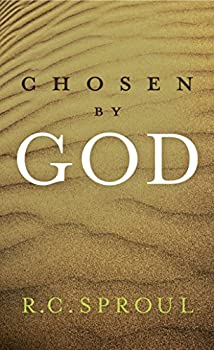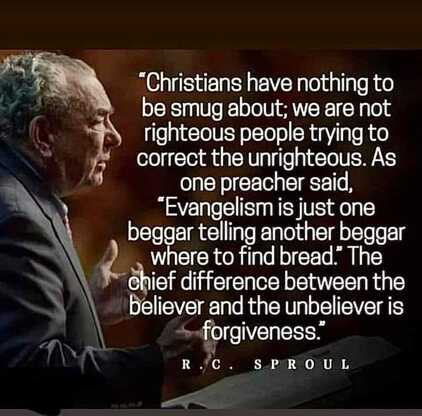RC sproul
Robert Charles Sproul (born February 13, 1939) is an American Calvinist theologian, author, and pastor. He is the founder and chairman of Ligonier Ministries (named after the Ligonier Valley just outside of Pittsburgh, where the ministry started as a study center for college and seminary students) and can be heard daily on the Renewing Your Mind radio broadcast in the United States and internationally. "Renewing Your Mind with Dr. R.C. Sproul" is also broadcast on Sirius and XM satellite radio. In late July 2012, a new 24-hour online radio station called RefNet (Reformation Network) was also announced by Ligonier Ministries in an effort to reach "as many people as possible" where Internet access is available. Ligonier Ministries hosts several theological conferences each year, including the main conference held each year in Orlando, FL, at which Sproul is one of the primary speakers. Sproul was passenger on the Amtrak train that derailed in the 1993 Big Bayou Canot train wreck and often gives firsthand accounts of the story.

R.C. Sproul: How the Reformation Spread
The rapid spread of the Protestant Reformation from Wittenberg, Germany, throughout Europe and across the Channel to England was not spawned by the efforts of a globe-trotting theological entrepreneur. On the contrary, for the most part Martin Luther’s entire career was spent teaching in the village of Wittenberg at the university there. Despite his fixed position, Luther’s influence spread from Wittenberg around the world in concentric circles—like when a stone is dropped into a pond. The rapid expanse of the Reformation was hinted at from the very beginning when the Ninety-Five Theses were posted on the church door (intended for theological discussion among the faculty). Without Luther’s knowledge and permission, his theses were translated from Latin into German and duplicated on the printing press and spread to every village in Germany within two weeks. This was a harbinger of things to come. Many means were used to spread Luther’s message to the continent and to England. -11.22.22 |
 RC Sproul
RC Sproul
“Here, then, is the real problem of our negligence. We fail in our duty to study God's Word not so much because it is difficult to understand, not so much because it is dull and boring, but because it is work. Our problem is not a lack of intelligence or a lack of passion. Our problem is that we are lazy. ” ― R. C. Sproul
Aug 20, 2015: Youtube: R.C. Sproul: The End & Purpose of the World
Those who walk merely by sight will almost always despair at the conditions in the sin-sick world around them. In this session, Dr. R.C. Sproul will remind us that the world ultimately exists to make manifest the glory of Christ. He will affirm that in the midst of our hardships or in the midst of decline, God is on His throne, working all things according to the good pleasure of His will. He will encourage us by saying that while we labor in God's name, the Lord does indeed reign.
Jan 1, 2015: RC Sproul: Jesus Changes Everything: An Announcement Regarding My Future Ministry
Oct 23, 2014: Life News: Evangelist Dr. R.C. Sproul: Abortion is Not a Christian Response in Cases of Rape
Recently my brother bought a book for me written by Dr. R.C. Sproul Sr. entitled “Now That’s a Good Question!” because I am a fan of Dr. Sproul’s normally well-crafted and thoughtful defense of the Christian faith. I started flipping through and read Sproul’s answer to the question, “Is a woman acting in sin when she aborts a pregnancy that is the result of rape?”
Those who walk merely by sight will almost always despair at the conditions in the sin-sick world around them. In this session, Dr. R.C. Sproul will remind us that the world ultimately exists to make manifest the glory of Christ. He will affirm that in the midst of our hardships or in the midst of decline, God is on His throne, working all things according to the good pleasure of His will. He will encourage us by saying that while we labor in God's name, the Lord does indeed reign.
Jan 1, 2015: RC Sproul: Jesus Changes Everything: An Announcement Regarding My Future Ministry
Oct 23, 2014: Life News: Evangelist Dr. R.C. Sproul: Abortion is Not a Christian Response in Cases of Rape
Recently my brother bought a book for me written by Dr. R.C. Sproul Sr. entitled “Now That’s a Good Question!” because I am a fan of Dr. Sproul’s normally well-crafted and thoughtful defense of the Christian faith. I started flipping through and read Sproul’s answer to the question, “Is a woman acting in sin when she aborts a pregnancy that is the result of rape?”
Sept 8, 2014: Renewing Your Mind: Not A Chance, Interview with R.C. Sproul and Keith Mathison
Today Dr. R.C. Sproul and Dr. Keith Mathison discuss their new book, Not A Chance: God, Science, and the Revolt Against Reason.
July 7, 2014: The Reusrgence: Best Books: The Holiness of God, by R.C. Sproul
Our “best books” series spotlights essential reading for Christian leaders. This week’s pick is The Holiness of God, by R.C. Sproul.
Today Dr. R.C. Sproul and Dr. Keith Mathison discuss their new book, Not A Chance: God, Science, and the Revolt Against Reason.
July 7, 2014: The Reusrgence: Best Books: The Holiness of God, by R.C. Sproul
Our “best books” series spotlights essential reading for Christian leaders. This week’s pick is The Holiness of God, by R.C. Sproul.
 RC Sproul
RC Sproul
“God is not blind; neither is He capricious. For Him there are no accidents. With God there are no cases of chance events.” – R.C. Sproul
“We may live in a culture that believes everyone will be saved, that we are ‘justified by death’ and all you need to do to go to heaven is die, but God’s Word certainly doesn’t give us the luxury of believing that.” – R.C. Sproul
“By His life, death, and resurrection, our Savior has conquered our enemies, and by His Spirit He has granted us to share in the victory.” – R.C. Sproul
“The very heart of worship, as the Bible makes clear, is the business of expressing, from the depths of our spirits, the highest possible honor we can offer before God.” – R.C. Sproul
“The atonement is a multifaceted event—Jesus is shown providing surety for our debt to God, mediating the enmity between us and God, and offering Himself as a substitute to suffer God’s judgment in our place.” – R.C. Sproul
“We may live in a culture that believes everyone will be saved, that we are ‘justified by death’ and all you need to do to go to heaven is die, but God’s Word certainly doesn’t give us the luxury of believing that.” – R.C. Sproul
“By His life, death, and resurrection, our Savior has conquered our enemies, and by His Spirit He has granted us to share in the victory.” – R.C. Sproul
“The very heart of worship, as the Bible makes clear, is the business of expressing, from the depths of our spirits, the highest possible honor we can offer before God.” – R.C. Sproul
“The atonement is a multifaceted event—Jesus is shown providing surety for our debt to God, mediating the enmity between us and God, and offering Himself as a substitute to suffer God’s judgment in our place.” – R.C. Sproul
 RC Sproul
RC Sproul
Excerpt from a sermon by RC Sproul:
One of the most ghastly doctrines that has made its way through the Evangelical Church today is this idea of the “carnal Christian.” The Carnal Christian is described as a person who is truly redeemed but whose life never brings forth fruit. Even though they’re saved they are still altogether and completely carnal. Don’t confuse this with what the New Testament teaches about the TRULY converted Christian who has to fight against his flesh all of his life. But there’s no such thing as a Christian who is totally carnal. It’s a contradiction in terms.
But why does that doctrine emerge? I’ll tell you where it comes from. It comes from Evangelists who can’t stand to admit the idea that they are dealing with false professions all the time. They see people who make the profession and have no change in their life and they say “well, we’ll still count them as converts. They’re just carnal Christians.” And this gives confidence to people who are not converted that in fact they are converted.
But if the parable really is going to be called the parable of the soil, then we have to understand the ONLY ONES who bring forth fruit, the harvest of thirtyfold, sixtyfold and a hundredfold, are those where the seed falls upon good soil.
Now here’s where we have to be very, very careful. We could say “well the good soil means that the seed is not going to take root unless the person who receives that seed, who hears that word is a good person. “I’m a Christian because I believed the word and the reason why I believe the word is because I am a good man.” If that’s how I think, I’ve never received the word at all.
That’s not the point of this parable.
What makes the soil “good” soil?
Again it drives us back to that question that we hear all the time in theology, “why does one person receive the word of God in their heart and another person doesn’t?”
Is it because there is something more righteous in the person who receives it than in the person who rejects it? That’s the majority view out there, believe it or not. Some people think that the reason they’re Christians is because OUT OF THEIR OWN WILL, they made the right decision, they embraced Christ, where their friends, hardened their hearts and did not use their will to embrace the gospel. And that person therefore has something in which to boast, and to boast eternally, because they said ‘yes.’
No. The Scriptures tell us… Jesus tells us clearly that unless a man is born again he can’t even see the kingdom of God. He can’t enter the kingdom of God.
Jesus told His disciples in John chapter 6 ‘nobody can come to Him unless it is given to him by the Father.’ Paul emphasizes that in his letter to the Ephesians when he says, ‘you hath he quickened.. when you were dead in trespasses and sin. By grace you have been saved through faith and that not of yourselves, it is the gift of God.’
What makes the soil good is the immediate, supernatural work on the soul by God, the Holy Spirit. The only people who ever embrace the word of God are those who have first been changed by the Holy Ghost TO receive the word of God,
What I’m saying, get it clear, is that your regeneration comes before your faith. The Holy Spirit has to change your heart before you will ever say ‘yes’ to Jesus. And that’s the power of the sower, because the sower prepares the soil to receive the seed.
That’s why we say ‘salvation is of the Lord’ and to Him and to Him alone belongs the glory.
One of the most ghastly doctrines that has made its way through the Evangelical Church today is this idea of the “carnal Christian.” The Carnal Christian is described as a person who is truly redeemed but whose life never brings forth fruit. Even though they’re saved they are still altogether and completely carnal. Don’t confuse this with what the New Testament teaches about the TRULY converted Christian who has to fight against his flesh all of his life. But there’s no such thing as a Christian who is totally carnal. It’s a contradiction in terms.
But why does that doctrine emerge? I’ll tell you where it comes from. It comes from Evangelists who can’t stand to admit the idea that they are dealing with false professions all the time. They see people who make the profession and have no change in their life and they say “well, we’ll still count them as converts. They’re just carnal Christians.” And this gives confidence to people who are not converted that in fact they are converted.
But if the parable really is going to be called the parable of the soil, then we have to understand the ONLY ONES who bring forth fruit, the harvest of thirtyfold, sixtyfold and a hundredfold, are those where the seed falls upon good soil.
Now here’s where we have to be very, very careful. We could say “well the good soil means that the seed is not going to take root unless the person who receives that seed, who hears that word is a good person. “I’m a Christian because I believed the word and the reason why I believe the word is because I am a good man.” If that’s how I think, I’ve never received the word at all.
That’s not the point of this parable.
What makes the soil “good” soil?
Again it drives us back to that question that we hear all the time in theology, “why does one person receive the word of God in their heart and another person doesn’t?”
Is it because there is something more righteous in the person who receives it than in the person who rejects it? That’s the majority view out there, believe it or not. Some people think that the reason they’re Christians is because OUT OF THEIR OWN WILL, they made the right decision, they embraced Christ, where their friends, hardened their hearts and did not use their will to embrace the gospel. And that person therefore has something in which to boast, and to boast eternally, because they said ‘yes.’
No. The Scriptures tell us… Jesus tells us clearly that unless a man is born again he can’t even see the kingdom of God. He can’t enter the kingdom of God.
Jesus told His disciples in John chapter 6 ‘nobody can come to Him unless it is given to him by the Father.’ Paul emphasizes that in his letter to the Ephesians when he says, ‘you hath he quickened.. when you were dead in trespasses and sin. By grace you have been saved through faith and that not of yourselves, it is the gift of God.’
What makes the soil good is the immediate, supernatural work on the soul by God, the Holy Spirit. The only people who ever embrace the word of God are those who have first been changed by the Holy Ghost TO receive the word of God,
What I’m saying, get it clear, is that your regeneration comes before your faith. The Holy Spirit has to change your heart before you will ever say ‘yes’ to Jesus. And that’s the power of the sower, because the sower prepares the soil to receive the seed.
That’s why we say ‘salvation is of the Lord’ and to Him and to Him alone belongs the glory.
May 9, 2014: Baptist Press: HGTV cancels show; stars called 'anti-gay'
R.C. Sproul Jr., a teaching fellow for Ligonier Ministries, tweeted, "Unless the Lord build the house they labor in vain who build it. God bless you and stand strong @BenhamBrothers.
R.C. Sproul Jr., a teaching fellow for Ligonier Ministries, tweeted, "Unless the Lord build the house they labor in vain who build it. God bless you and stand strong @BenhamBrothers.
May 9, 2014: Williston Herald: Correcting a few false charges against Christianity
was listening to a talk by R.C. Sproul where he talks about Polycarp, the same one mentioned in the New Testament.
Apparently he was accused of being an atheist and brought before the Caesar.
The Caesar didn’t want to make him a martyr, so he told Polycarp that all he had to do was say he’s not an atheist. Well, any Christian doesn’t have a problem saying he’s not an atheist.
So that’s what Polycarp did. He announced, “I’m not an atheist!” But he got a little too carried away and called Caesar the atheist. Things didn’t end well for Polycarp.
In his First Apology, Justin Martyr set out to correct these misconception
was listening to a talk by R.C. Sproul where he talks about Polycarp, the same one mentioned in the New Testament.
Apparently he was accused of being an atheist and brought before the Caesar.
The Caesar didn’t want to make him a martyr, so he told Polycarp that all he had to do was say he’s not an atheist. Well, any Christian doesn’t have a problem saying he’s not an atheist.
So that’s what Polycarp did. He announced, “I’m not an atheist!” But he got a little too carried away and called Caesar the atheist. Things didn’t end well for Polycarp.
In his First Apology, Justin Martyr set out to correct these misconception
May 21, 2008: Creation Ministries: Famous evangelical apologist changes his mind
RC Sproul is a well-known evangelical scholar who has authored some 60 books and produced an enormous selection of other resources such as audio tapes and videos. According to Ligonier Ministries, founded by Dr Sproul, he has degrees from Westminster College, Pennsylvania, Pittsburgh Theological Seminary, and the Free University of Amsterdam.
RC Sproul is a well-known evangelical scholar who has authored some 60 books and produced an enormous selection of other resources such as audio tapes and videos. According to Ligonier Ministries, founded by Dr Sproul, he has degrees from Westminster College, Pennsylvania, Pittsburgh Theological Seminary, and the Free University of Amsterdam.
May 21, 2008: Old Testament Studies: R. C. Sproul’s Literal Interpretation of Genesis 1
After my conversion in the late 1960s, I remember hearing Dr. R. C. Sproul speak on a number of occasions. Back in those days as a Freudian Psychology major in college, Sproul’s Calvinistic teaching was something of a theological electroshock therapy for my man-centered perspective on life
After my conversion in the late 1960s, I remember hearing Dr. R. C. Sproul speak on a number of occasions. Back in those days as a Freudian Psychology major in college, Sproul’s Calvinistic teaching was something of a theological electroshock therapy for my man-centered perspective on life
-

Some quotes from Dr. R. C. Sproul’s book, “Chosen by God: (Published January 1986):
“There are different views of double predestination. One of these is so frightening that many shun the term altogether, lest their view of the doctrine be confused with the scary one. This is called the equal ultimacy view.
Equal ultimacy is based on a concept of symmetry. It seeks a complete balance between election and reprobation. The key idea is this: Just as God intervenes in the lives of the elect to create faith in their hearts, so God equally intervenes in the lives of the reprobate to create or work unbelief in their hearts. The idea of God’s actively working unbelief in the hearts of the reprobate is drawn from biblical statements about God hardening people’s hearts.
Equal ultimacy is NOT the Reformed or Calvinist view of predestination. Some have called it ‘hyper-Calvinism.’ I prefer to call it ‘sub-Calvinism’ or, better yet, ‘anti-Calvinism.’ Though Calvinism certainly has a view of double predestination, the double predestination it embraces is not one of equal ultimacy” (p. 142; emphasis Sproul’s; italicized in the original).
“To understand the Reformed view of the matter we must pay close attention to the crucial distinction between positive and negative decrees of God. Positive has to do with God’s active intervention in the hearts of the elect. Negative has to do with God’s passing over the non-elect.
The Reformed view teaches that God positively or actively intervenes in the lives of the elect to insure their salvation. The rest of mankind God leaves to themselves. He does not create unbelief in their hearts. That unbelief is already there. He does not coerce them to sin. They sin by their own choices” (pp. 142-143).
“The dreadful error of hyper-Calvinism is that it involves God in coercing sin. This does radical violence to the integrity of God’s character. The primary biblical example that might tempt one toward hyper-Calvinism is the case of Pharaoh” (p. 143).
The Bible clearly teaches that God did, in fact, harden Pharaoh’s heart. Now we know that God did this for his own glory and as a sign to both Israel and Egypt. We know that God’s purpose in all of this was a redemptive purpose. But we are still left with a nagging problem. God hardened Pharaoh’s heart and then judged Pharaoh for his sin. How can God hold Pharaoh or anyone else accountable for sin that flows out of a heart that God himself hardened?
Our answer to that question will depend on how we understand God’s act of hardening. How did he harden Pharaoh’s heart? The Bible does not answer that question explicitly. As we think about it, we realize that basically there are only two ways he could have hardened Pharaoh’s heart: actively or passively” (p. 144).
“Active hardening would involve God’s direct intervention within the inner chambers of Pharaoh’s heart. God would intrude into Pharaoh’s heart and create fresh evil in it. This would certainly insure that Pharaoh would bring forth the result that God was looking for. It would also insure that God is the author of sin.
Passive hardening is a totally different story. Passive hardening involves a divine judgment upon sin that is already present. All that God needs to do to harden the heart of a person whose heart is already desperately wicked is to ‘give him over to his sin.’ We find this concept of divine judgment repeatedly in Scripture” (pp. 144-145).
“How does this work? To understand it properly we must first look briefly at another concept, God’s common grace …One of the most important elements of common grace we enjoy is the restraint of evil in the world…By his grace he controls and bridles the amount of evil in this world. If evil were left totally unchecked, then life on this planet would be impossible.
All that God has to do to harden people’s hearts is to remove the restraints. He gives them a longer leash. Rather than restricting their human freedom, he increases it. He lets them have their own way. In a sense he gives them enough rope to hang themselves. It is not that God puts his hand on them to create fresh evil in their hearts; he merely removes his holy hand of restraint from them and lets them do their own will” (p. 145).
“About the only restraint there was on Pharaoh’s wickedness was the holy arm of God. All God had to do to harden Pharaoh further was to remove his arm. The evil inclinations of Pharaoh did the rest.
In the act of passive hardening, God makes a decision to remove the restraints; the wicked part of the process is done by Pharaoh himself. God does no violence to Pharaoh’s will. As we said, he merely gives Pharaoh MORE freedom…We see the same kind of thing in the case of Judas…Judas was not a poor innocent victim of divine manipulation. He as not a righteous man whom God forced to betray Christ and then punished for the betrayal. Judas betrayed Christ because Judas wanted thirty pieces of silver…To be sure, God uses the evil inclinations and evil intentions of fallen men to bring about his own redemptive purposes. Without Judas there is no Cross. Without the cross there is no redemption. But this is not a case of God coercing evil” (pp. 146-147; Sproul’s emphasis is italicized in the original).
“In God’s ultimate act of judgment he gives sinners over to their sins. In effect, he abandons them to their own desires. So it was with Pharaoh. By this act of judgment, God did not blemish his own righteousness by creating fresh evil in Pharaoh’s heart. He established his own righteousness by punishing the evil that was already there in Pharaoh.
This is how we must understand double predestination. God gives mercy to the elect by working faith in their hearts. He gives justice to the reprobate by leaving them in their own sins” (pp. 147-148).January 1986
“There are different views of double predestination. One of these is so frightening that many shun the term altogether, lest their view of the doctrine be confused with the scary one. This is called the equal ultimacy view.
Equal ultimacy is based on a concept of symmetry. It seeks a complete balance between election and reprobation. The key idea is this: Just as God intervenes in the lives of the elect to create faith in their hearts, so God equally intervenes in the lives of the reprobate to create or work unbelief in their hearts. The idea of God’s actively working unbelief in the hearts of the reprobate is drawn from biblical statements about God hardening people’s hearts.
Equal ultimacy is NOT the Reformed or Calvinist view of predestination. Some have called it ‘hyper-Calvinism.’ I prefer to call it ‘sub-Calvinism’ or, better yet, ‘anti-Calvinism.’ Though Calvinism certainly has a view of double predestination, the double predestination it embraces is not one of equal ultimacy” (p. 142; emphasis Sproul’s; italicized in the original).
“To understand the Reformed view of the matter we must pay close attention to the crucial distinction between positive and negative decrees of God. Positive has to do with God’s active intervention in the hearts of the elect. Negative has to do with God’s passing over the non-elect.
The Reformed view teaches that God positively or actively intervenes in the lives of the elect to insure their salvation. The rest of mankind God leaves to themselves. He does not create unbelief in their hearts. That unbelief is already there. He does not coerce them to sin. They sin by their own choices” (pp. 142-143).
“The dreadful error of hyper-Calvinism is that it involves God in coercing sin. This does radical violence to the integrity of God’s character. The primary biblical example that might tempt one toward hyper-Calvinism is the case of Pharaoh” (p. 143).
The Bible clearly teaches that God did, in fact, harden Pharaoh’s heart. Now we know that God did this for his own glory and as a sign to both Israel and Egypt. We know that God’s purpose in all of this was a redemptive purpose. But we are still left with a nagging problem. God hardened Pharaoh’s heart and then judged Pharaoh for his sin. How can God hold Pharaoh or anyone else accountable for sin that flows out of a heart that God himself hardened?
Our answer to that question will depend on how we understand God’s act of hardening. How did he harden Pharaoh’s heart? The Bible does not answer that question explicitly. As we think about it, we realize that basically there are only two ways he could have hardened Pharaoh’s heart: actively or passively” (p. 144).
“Active hardening would involve God’s direct intervention within the inner chambers of Pharaoh’s heart. God would intrude into Pharaoh’s heart and create fresh evil in it. This would certainly insure that Pharaoh would bring forth the result that God was looking for. It would also insure that God is the author of sin.
Passive hardening is a totally different story. Passive hardening involves a divine judgment upon sin that is already present. All that God needs to do to harden the heart of a person whose heart is already desperately wicked is to ‘give him over to his sin.’ We find this concept of divine judgment repeatedly in Scripture” (pp. 144-145).
“How does this work? To understand it properly we must first look briefly at another concept, God’s common grace …One of the most important elements of common grace we enjoy is the restraint of evil in the world…By his grace he controls and bridles the amount of evil in this world. If evil were left totally unchecked, then life on this planet would be impossible.
All that God has to do to harden people’s hearts is to remove the restraints. He gives them a longer leash. Rather than restricting their human freedom, he increases it. He lets them have their own way. In a sense he gives them enough rope to hang themselves. It is not that God puts his hand on them to create fresh evil in their hearts; he merely removes his holy hand of restraint from them and lets them do their own will” (p. 145).
“About the only restraint there was on Pharaoh’s wickedness was the holy arm of God. All God had to do to harden Pharaoh further was to remove his arm. The evil inclinations of Pharaoh did the rest.
In the act of passive hardening, God makes a decision to remove the restraints; the wicked part of the process is done by Pharaoh himself. God does no violence to Pharaoh’s will. As we said, he merely gives Pharaoh MORE freedom…We see the same kind of thing in the case of Judas…Judas was not a poor innocent victim of divine manipulation. He as not a righteous man whom God forced to betray Christ and then punished for the betrayal. Judas betrayed Christ because Judas wanted thirty pieces of silver…To be sure, God uses the evil inclinations and evil intentions of fallen men to bring about his own redemptive purposes. Without Judas there is no Cross. Without the cross there is no redemption. But this is not a case of God coercing evil” (pp. 146-147; Sproul’s emphasis is italicized in the original).
“In God’s ultimate act of judgment he gives sinners over to their sins. In effect, he abandons them to their own desires. So it was with Pharaoh. By this act of judgment, God did not blemish his own righteousness by creating fresh evil in Pharaoh’s heart. He established his own righteousness by punishing the evil that was already there in Pharaoh.
This is how we must understand double predestination. God gives mercy to the elect by working faith in their hearts. He gives justice to the reprobate by leaving them in their own sins” (pp. 147-148).January 1986





